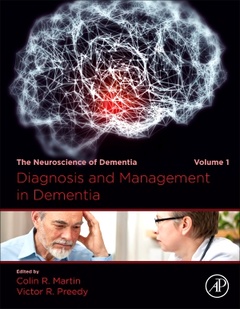Diagnosis and Management in Dementia The Neuroscience of Dementia, Volume 1
Coordonnateurs : R Martin Colin, Preedy Victor R

Section 1 Dementia: Introductory Chapters 1. A review of the different types of dementia2. The classification of dementia: problems and challenges3. Alzheimer’s disease: an overview4. Dementia and competing hypothesis – the example of Alzheimer’s disease and its various hypotheses5. Lewy body dementia – an overview6. Mixed dementia – an overview7. Vascular dementia – an overview8. Linking in physical activity and dementia9. Risk factors in dementia10. Mortality in dementia – linking in delirium11. Rare forms of dementia12. Prion diseases and dementia13. Dementia in Parkinson disease14. Dementia in traumatic brain injury15. Risk factors in dementia – towards a coherent theory of dementia16. Genetics of dementia
Section 2 Biomarkers, Psychometric Instruments, and Diagnosis 17. Circulating biomarkers in neurodegenerative dementias – YKL-40 and beyond18. Salivary biomarkers in Alzheimer’s disease19. Use of cerebrospinal fluid in diagnosis of dementias20. SPECT perfusion imaging in assessment of neurodegenerative dementias21. Computerised tomography (CT) in assessment of neurodegenerative dementias22. Magnetic resonance imaging (MRI) in assessment of neurodegenerative dementias23. Questionnaires: The mini-mental state examination (MMSE) and beyond24. The Cambridge Mental Disorders of the Elderly Examination (CAMDEX) and applications to dementia25. The Montreal Cognitive Assessment (MoCA) and applications to dementia26. The Hopkins Verbal Learning Test (HVLT) and applications to dementia27. The Addenbrooke’s Cognitive Examination (ACE) and applications to dementia28. ALBA Screening Instrument (ASI) and applications to dementia29. The prediction of Alzheimer’s disease
Section 3 Pharmacological Treatments for Dementia30. Cholinesterase inhibitors in dementias – an overview31. NMDA receptor antagonists in dementia – an overview32. Donepezil usage – a focused review33. Rivastigmine usage – a focused review34. Galantamine usage – a focused review35. Memantine – a focused review36. Failures and successes of monoclonal antibodies – bapineuzumab and beyond37. Immunotherapies: an overview
Section 4 Non-Pharmacological Treatments38. Internet counselling39. Counselling in dementia40. Cognitive rehabilitation in dementia41. Cognitive stimulation in dementia42. Anodal Transcranial Direct Current Stimulation43. Nanoparticles: nanodiamond treatment in Alzheimer’s disease44. Increasing intakes and improving nutritional status in dementia45. All-trans retinoic acid in Alzheimer’s disease46. Environmental enrichment in dementia47. Music therapy in dementia48. Aromatherapy in dementia49. Massage in dementia50. Dancing in dementia51. Multisensory Stimulation in Dementia52. Animal-assisted therapy in dementia53. Occupational therapy in dementia
- Offers comprehensive coverage of a broad range of topics related to dementia
- Serves as a foundational collection for neuroscientists and neurologists on the biology of dementia and brain dysfunction
- Contains in each chapter an abstract, key facts, mini dictionary of terms, and summary points to aid in understanding
- Provides unique sections on specific subareas, intellectual components, and knowledge-based niches that will help readers navigate key areas for research and further clinical recommendations
- Features preclinical and clinical studies to help researchers map out key areas for research and further clinical recommendations
- Serves as a "one-stop" source for everything you need to know about dementia
Date de parution : 10-2020
Ouvrage de 910 p.
19x23.3 cm
Thèmes de Diagnosis and Management in Dementia :
Mots-clés :
Dementia; Alzheimer's disease; Lewy body dementia; vascular dementia; memory; cognition; sleep; aggression; neuroinflammation; amyloid; depression; microRNA; therapy



